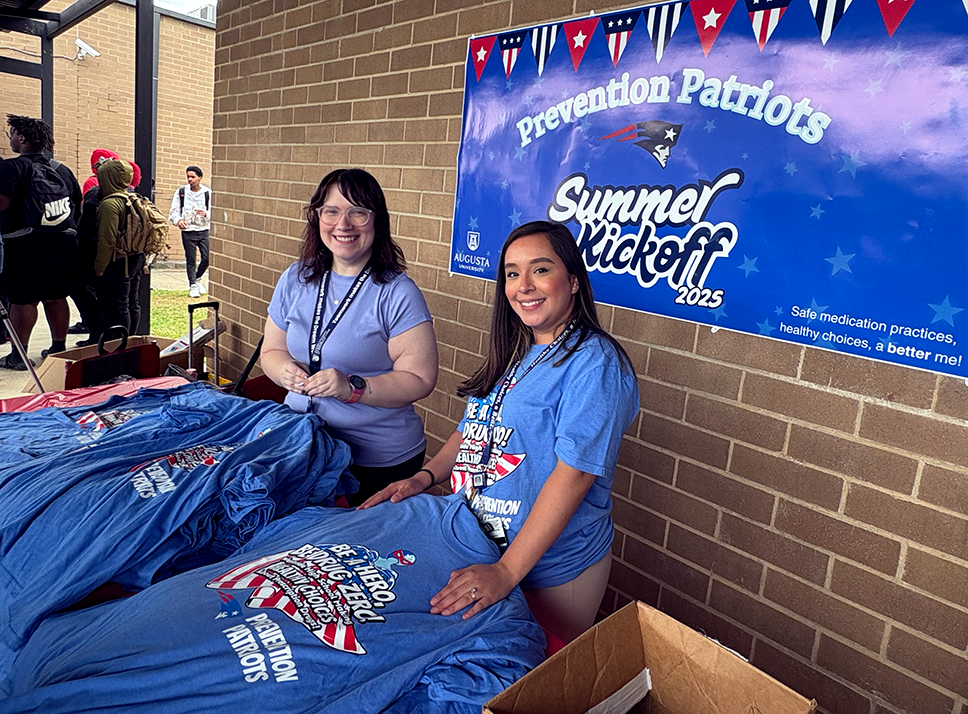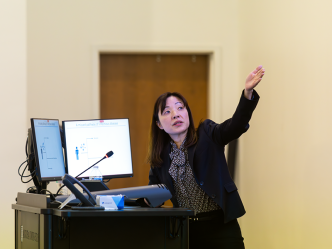Hundreds of energetic students poured into the back parking lot of Westside High School recently, eagerly waiting in line to grab a treat from the Rita’s Italian Ice & Frozen Custard truck and pick up an eye-catching blue T-shirt with “Be a Hero, be Drug Zero!” printed on it – all in the name of preventing the misuse of opioids and prescription medications.
It was the end-of-the-school-year celebration for the “Prevention Patriots,” a group of WHS students who are saying “no” to opioids and other prescription medications and are working to convince their classmates to do the same through a partnership with Augusta University and the state of Georgia.
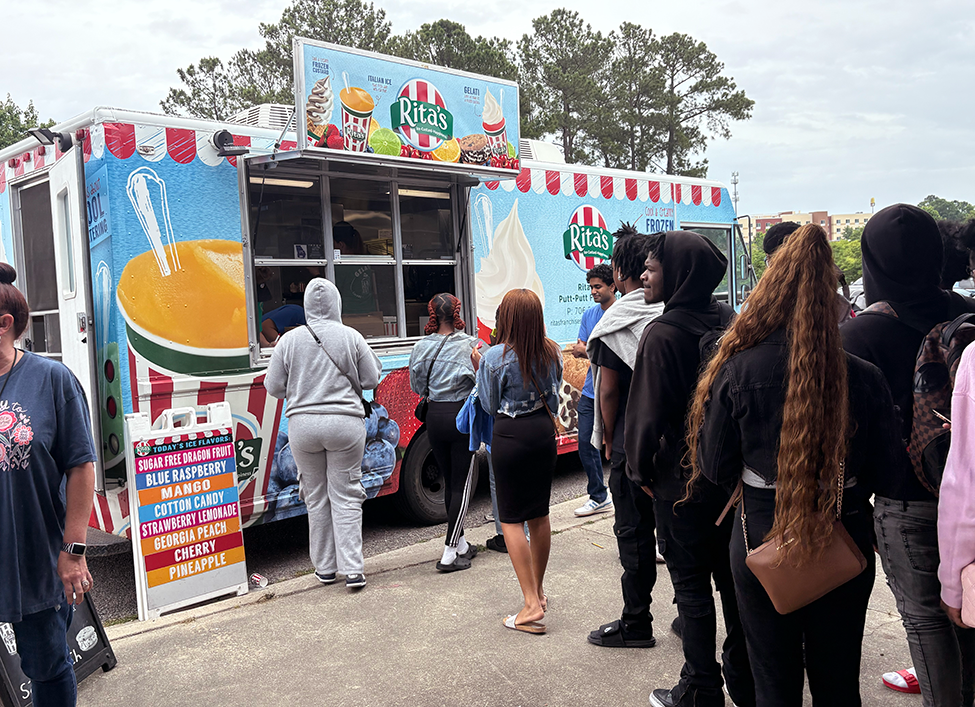
“This has been a really successful program as far as the outcomes we’ve been looking at,” said Marlo Vernon, PhD, an associate professor at AU’s Medical College of Georgia and the School of Public Health. “We’ve seen significant increases in awareness and knowledge.”
According to a study by the Centers for Disease Control and Prevention, nearly 8.6 million Americans reported misusing prescription opioids in 2023.
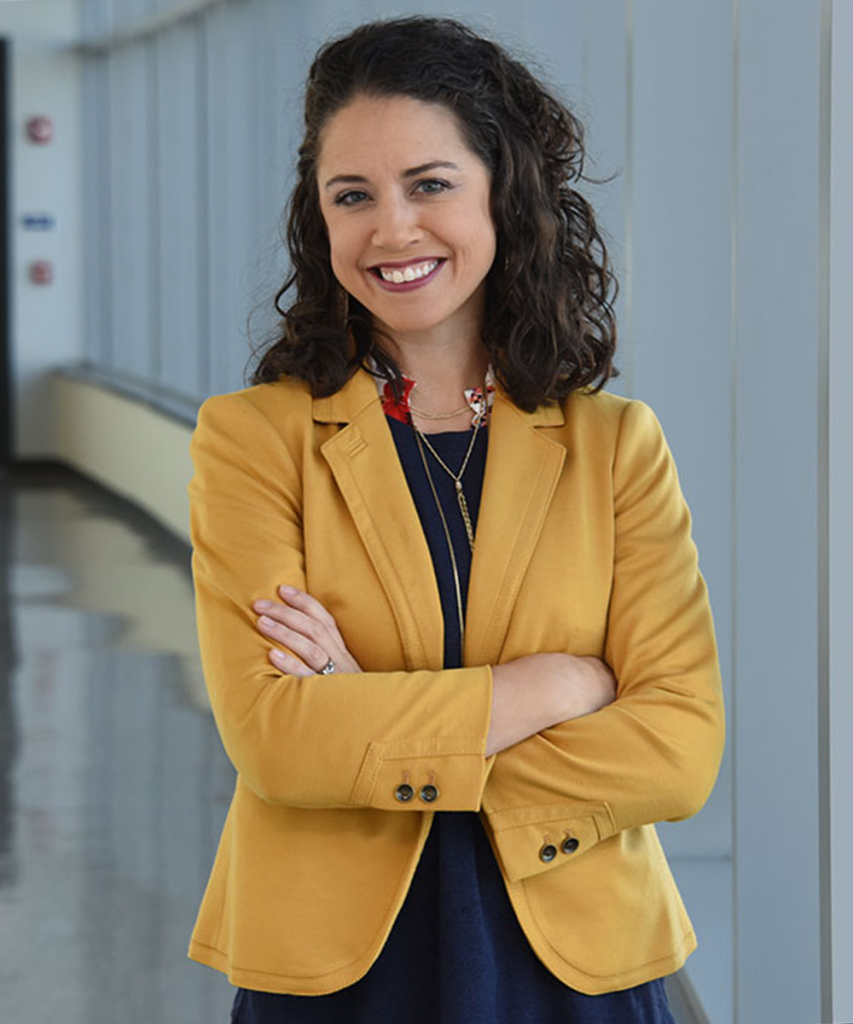
Closer to home, from 2018-2022, the second highest opioid-related death rate in the state of Georgia was in Region 2, which encompasses every county in the CSRA – and the highest number of opioid-related deaths was in Richmond County, according to a 2024 report by the Georgia Department of Behavioral Health and Developmental Disabilities.
“We’ve all heard about the increase in overdose deaths, but what I think we miss in the messaging is the huge increase in youth ages 10 to 19,” Vernon said.
According to the report, ages 10 to 19 saw the largest percent increase (400%) in total opioid overdose deaths from 1 in 2018 to 5 in 2022, with the majority of these deaths attributed to synthetic opioids.
In an effort to improve these statistics and increase prevention efforts in our area, the partnership between AU and Georgia’s Adopt-a-School program has been going strong for five years now. Funded by the Georgia Department of Behavioral Health and Developmental Disabilities, Vernon has spearheaded the program and has worked alongside undergraduate and graduate students from AU, MCG, the Georgia Prevention Institute and the Cancer Prevention, Control and Population Health program at Augusta University’s Georgia Cancer Center to bring it to local schools.
Tutt Middle School is where they started their work in 2019. That group of students reported rarely or never using prescription drugs, and the team wanted to help prevent the problem before it began.
“When it comes to misusing opioids or becoming addicted to opioids, especially for our youth, it’s more of an opportunity,” Vernon said. “I think starting as early as possible is the way to go always.”
The program at Tutt was a big success, with Tikki Middleton, EdD, helping to fortify it as the principal of the school during the time.
Middleton is now the principal at Westside High School, and, for the past two years, the program has transitioned to the “Prevention Patriots,” and even more students are being engaged. Middleton, being a proponent of the program since her days at Tutt, is a testament to the impact it’s had on her students.
“This is what we would refer to as a culminating activity. There has been a series of student leaders who helped the AU partners to lead an initiative on avoiding drug use, which is especially important after they presented opioid overdose and use in the area,” she said.
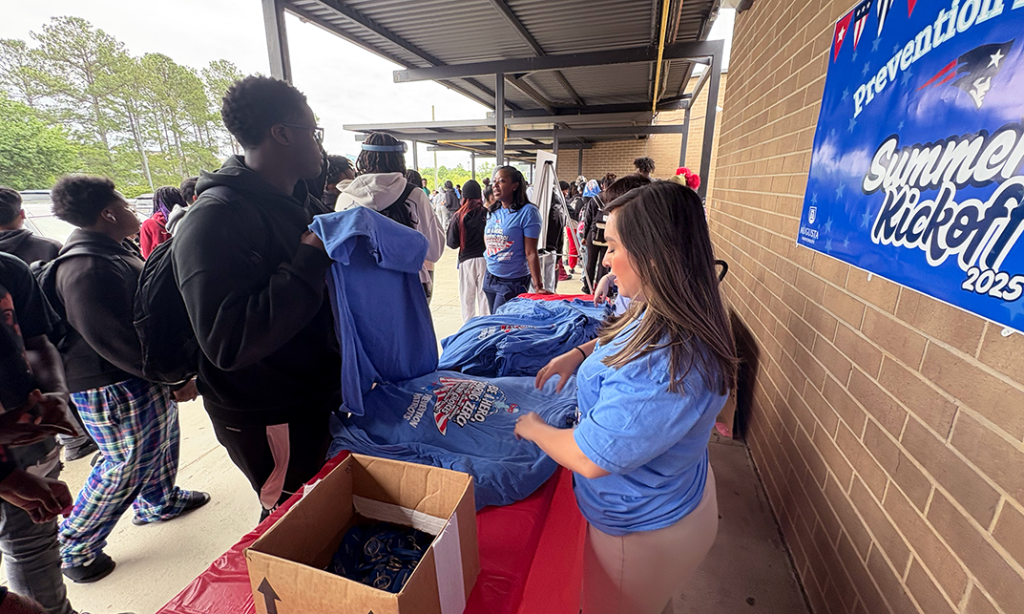
Before the beginning of the school year, every student in the school was given a survey to determine their knowledge, experiences and attitudes toward opioids and prescription medications. Then, two student leaders were selected from each homeroom to help dissect data and determine what kind of signage, student activities and preventive methods were needed to bring maximum awareness.
They met with the AU team at least two Wednesdays a month during their homeroom period to discuss their plans.
“The high schoolers have been a lot more involved with the poster and T-shirt designs. They’ve really had an active role in picking out the messaging and what we give out, but we always frame it in a positive way because it’s been proven that positive messages land better than negative ones, like ‘don’t do drugs.’” Vernon said. “It’s just been a little bit more student engagement with the high schoolers because they’re older.”
A main goal of the program was to clear up any confusion about what an opioid is and the dangers of misusing them.
“There’s still a lack of understanding of what we mean when we say opioid. For example, where it comes from, the different derivatives of it, knowing that it comes from poppies, the type of medications you might be prescribed that have opioids in it and the difference between opioids and fentanyl,” Vernon said. “So that not only do they understand, but then they can educate their friends and family about it, and that’s really been a big push for us.”
They also focus on safe storage and disposal of medications training – something that not a lot of people think twice about.
“They tell you not to dump them down the toilet, and they tell you not to throw them in the trash can, so what are you supposed to do with them?” Vernon said.
She and her team assist with drug take-back days in conjunction with the Richmond County Sheriff’s Office for people to safely dispose of their old prescription medications. There are usually sites in downtown Augusta and in South Augusta, and, over the years, hundreds of pounds of medications have been collected, with the most recent take-back day yielding 92 pounds.
“We’re utilizing the power of our youth to educate and then disseminate that information to the community at large,” Vernon said.
Eventually, the student leaders found themselves advocating for their message under the gold dome of Georgia’s State Capitol on Voices for Prevention Advocacy Day.
“It led to the opportunity to visit the State Capitol, which was really awesome,” Middleton said. “One of the student leaders was able to talk with two state representatives about the initiative and some of the activities that we had on campus.”
At the end of the school year, during the frozen custard celebration, all the students were given a post-program survey.
“That lets them know the growth from all the lessons, how far we’ve come. It also shows additional opportunities,” Middleton said. “So it’s been an awesome ride. High school has larger numbers, which is great because that deepens the impact.”
The program has a great impact on the college students, as well, making it rewarding for them to have a hand in stopping impressionable teenagers from going down the wrong path.
“I think when it comes to drug use and abuse, especially in high school, it’s not talked about in a way that prevents it. There is music and things that say it’s so cool, so I think it’s really exciting when the students come to us and they’re like, ‘no, don’t do it!’” said Maya Stephens, a second-year medical student at MCG and a member of the program. “The students are like, ‘Yeah, we’re not gonna do drugs,’ and it’s like, ‘Yes!’ Let’s change the narrative about drug use in high school.”
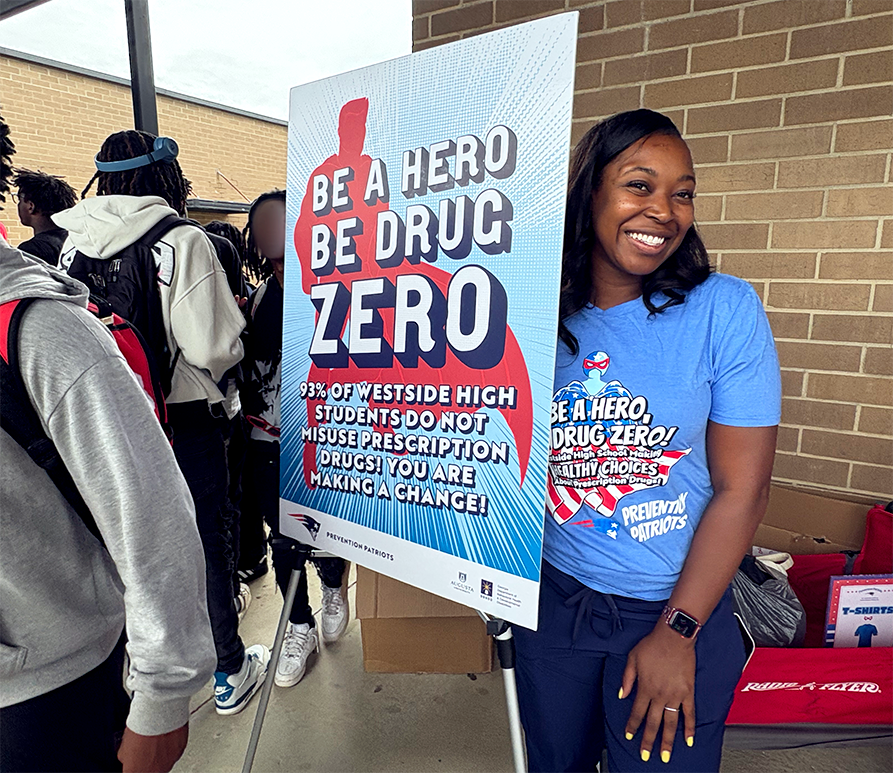
Being part of the program has also helped shape their future career goals while boosting their resumes.
“That peer education component really encourages them, and I’ve had a couple of medical students tell me when they went for their residency interviews, and they said they were in this program, they were asked questions about participating in this,” Vernon said. “So it’s become a part of how they present themselves to residency programs, which has really been a neat component that I hadn’t expected to be such a benefit to the medical student leaders.”
Vernon is looking forward to continuing the program at Westside for a few more years, depending on the grant funding, and then the state will decide where it will go next. The AU students also want to stay involved and hopefully expand it to more areas.
“I’ll be transitioning to the Marietta campus, so whatever role I can have from afar will be great,” Stephens said. “Maybe I’ll be able to go to another school and talk about the same things, but at least I’m more comfortable. It feels like we’ve made an impact on them, and they’ve been awesome.”
 Augusta University
Augusta University
